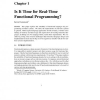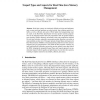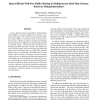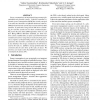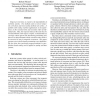116
click to vote
MACH
1990
15 years 1 months ago
1990
Distributed real-time systems play a very important role in our modern society. They are used in aircraft control, communication systems, military command and control systems, fac...
108
click to vote
SFP
2003
15 years 1 months ago
2003
Abstract This paper explores the suitability of functional languages for programming real-time systems. We study the requirements of real-time systems in general, outline typical l...
PLPV
2010
ACM
15 years 2 months ago
2010
ACM
Real-time systems, and in particular safety-critical systems, are a rich source of challenges for the program verification community as software errors can have catastrophic conse...
107
click to vote
ECOOP
2006
Springer
15 years 2 months ago
2006
Springer
Real-time systems are notoriously difficult to design and implement, and, as many real-time problems are safety-critical, their solutions must be reliable as well as efficient and ...
RTCSA
2000
IEEE
15 years 3 months ago
2000
IEEE
A space efficient wait-free algorithm for implementing a shared buffer for real-time multiprocessor systems is presented in this paper. The commonly used method to implement share...
ICSE
2000
IEEE-ACM
15 years 4 months ago
2000
IEEE-ACM
The next ten years will see distributed real-time computer systems replacing many mechanical and hydraulic control systems in high-dependability applications. In these application...
CODES
2001
IEEE
15 years 4 months ago
2001
IEEE
Power consumption is an important design parameter for embedded and portable systems. Software-controlled (or dynamic) power management (DPM) has recently emerged as an attractive...
166
click to vote
FASE
2004
Springer
15 years 4 months ago
2004
Springer
Real-Time Maude is a language and tool supporting the formal specification and analysis of real-time and hybrid systems. The specification formalism is based on rewriting logic, em...
112
click to vote
ATVA
2006
Springer
15 years 4 months ago
2006
Springer
In the past decades, many formal frameworks (e.g. timed automata and temporal logics) and techniques (e.g. model checking and theorem proving) have been proposed to model a real-ti...
COMPSAC
2004
IEEE
15 years 4 months ago
2004
IEEE
Temporal correctness is crucial to the dependability of real-time systems. Few methods exist to test for temporal correctness and most existing methods are ad-hoc. A problem with ...

